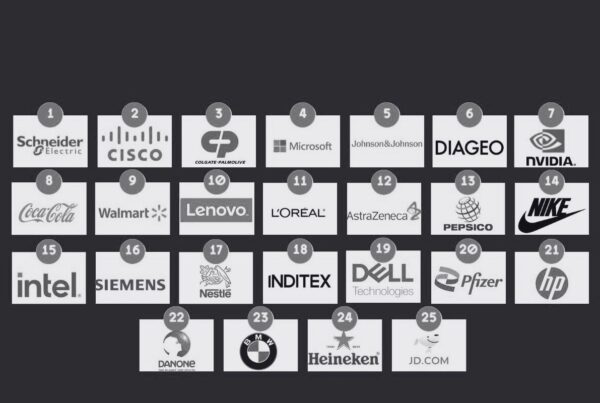Blockchain technology looks set to have a significant impact on the supply chain industry. This is because many of its characteristics and capabilities seem custom made for some of the largest challenges in supply chains. The term blockchain is one that I’m sure you are seeing associated with more and more companies and with greater frequency in the media, often in relation to Bitcoin or cryptocurrency. But what exactly is blockchain technology and what does the invention of a digital currency like Bitcoin actually offer the supply chain industry?
UNDERSTANDING BLOCKCHAIN
Blockchain was essentially born less than 10 years ago with the invention of Bitcoin, a digital currency experiment that allowed for two people to conduct a financial transaction over the internet without the use of any intermediary such as a bank or other middle man. This transaction was also recorded in a distributed public ledger so that both parties, as well as anyone else who wished to seek verification, could track and record the transaction.
It was soon realized however that the underlying technology behind Bitcoin could also be used for a vast array of other useful purposes. This underlying technology we now call blockchain. The distributed, digital ledger records each individual transaction in a series of blocks that can exist as multiple copies across many different computers, or nodes. The security of the ledger is maintained because every node retains a copy of the entire history of every transaction made on that blockchain, and each new block of transactions is linked back to each block before it. Once a block is verified through performing complex algorithms, the block is essentially locked and secured and every node records a copy of the new transactions. As the entire blockchain is decentralised, it doesn’t rely on any single body or have a single point of failure.
This distributed ledger technology also led to another innovation known as “smart contracts”, which were introduced by a second generation of blockchain technology called the Ethereum network. Ethereum allows small programs to be coded directly into the blockchain to allow financial instruments such as loans or bonds to be represented as contracts, rather than just the cash-like tokens used in Bitcoin.
Almost every major financial institution in the world as well as thousands of other companies across almost every industry are now conducting research into blockchain technology to see how it can be used to improve performance. As third and fourth generation blockchain innovations continue, we will increasingly see blockchains used to record and pay for all types of services around the world. If offers the potential to reduce transaction times for international payments from days to just minutes, and with vastly lower transaction costs. This is all while still maintaining a level of security in line with or greater than existing established payments systems such as Visa or SWIFT.
SO WHAT DOES ALL THIS HAVE TO DO WITH SUPPLY CHAIN?
The major reason that supply chain is so well suited to blockchain innovations is that supply chains themselves as well as the supply chain industry is highly complex. Supply chains involve many different businesses or individuals working together, where an element of trust needs to be established every step of the way. Currently, contracts must be handled by lawyers and bankers, which leads to high costs and long delays. It can take days to make payments between manufacturers, suppliers, vendors, and customers. And payment times and costs increase significantly when these transactions are international, despite living in a globalised world of commerce.
Parts and products need to arrive on time and undamaged, meaning there needs to be a tracking process in place to determine where defects may have occurred. Where the product is of high value, prone to breakage, or prone to spoilage such as when transporting fresh produce, these tracking processes become even more important and costly.
Blockchain technologies look to be able to solve many if not all of these challenges. Blockchain can be used to verify or track any type of exchange or agreement. Within a supply chain context, it can be applied to everything from smart, self-executing supply contracts to automated cold chain management. Blockchain offers the supply chain industry a shared ledger that is updated and validated in real time with every network participant. This allows for total and equal visibility of all transactions and activities as well as allowing for the location and condition of an asset to be known at any point in time.
BITCOIN FEATURES FOR SUPPLY CHAIN
Exactly the same blockchain features that secure Bitcoin transactions can be used to meet the needs for the integrity and reliability for a supply chain.
PRIMARY BENEFITS
Consensus – all parties along the entire chain can agree on the validity of every transaction. For Bitcoin, this refers to the value, timing, and recipient of a transaction while for supply chain it could mean a payment, warehousing, transport, or delivery.
Provenance – all parties know the complete history of each asset including who owned it previously and for what length of time. In Bitcoin, this asset is a cryptocurrency that represents a form of money. For supply chain, assets can include anything from fresh produce to raw materials, finished products to copyrights and contracts.
Immutability – no party has the ability to tamper with an entry stored on the distributed ledger. Once a transaction has been verified, it is permanently recorded and can never be erased. This is why a Bitcoin transaction cannot be cancelled or reversed. Only a new transaction can be used to offset a previous one. For supply chain this means that payments or inventory records can never be falsified and a complete record of delivery conditions, times, and dates can be known.
ADDITIONAL BENEFITS
Cost reductions – by using smart contracts and utilising the automated aspects of blockchain, organisations can significantly reduce legal and administrative costs as well as reducing the amount of paperwork required to manage operations.
Traceability – as well as tracking the real time position of products, sensors can be fitted in parts and products and integrated into the blockchain to continuously monitor useful metrics such as temperature, humidity, or acceleration to determine exactly where damage occurs.
Compliance – blockchain records improve visibility and compliance levels over traditional contract manufacturing.
FROM BITCOIN TO BUSINESS
One of the key advantages of supply chain blockchain use is that it is not necessary to use the vast “mining” networks of computers that Bitcoin uses to verify the Bitcoin blockchain transactions. Due to the vast size of the Bitcoin ledger and the complex algorithms used to verify each transaction, massive amounts of distributed computing power is needed to verify each new block of transactions. These computer systems, often running in locations with cheap electricity costs such as Mongolia or Iceland, are referred to as “miners”, and they earn small amounts of Bitcoin for each block they successfully verify and add to the blockchain. In the case of supply chain blockchains, it is not necessary to use mining. Blockchains for business use do not need these large mining networks as there are other, simpler options for securely updating the much smaller blockchain.
The applications of blockchain in supply chain are also much more diverse than just sending or receiving payments, with smart contracts offering very useful capabilities. Smart contracts are the pieces of software that execute the action carried out on the blockchain. The software is stored on the blockchain and automatically executes the smart contract when the desired conditions are met. This means that no interference or fraud is possible.
An example of smart contract use in supply chain could be the order to dispatch a product when a payment is received. They can be used for any number of other actions such as triggering a penalty if a product is not received by an agreed time. This completely avoids the need for any third party to manually check if an event has occurred, making supply chains more efficient. Significant amounts of time and expense can therefore be saved by automating many contract, tracking, or verification processes that currently must be manually performed.
SUPPLY CHAIN USE CASES
The following provides some real world use cases where blockchain technology can be utilised in the supply chain industry:
SUPPLIER PAYMENTS
Because blockchain allows transactions to be conducted anywhere in the world, international payments are just as simple as local ones. They also have very low transaction costs and are much faster than traditional bank transfers. Most transactions take just a few minutes, compared to international bank transfers that can take days. There are already Australian companies, such as the vehicle manufacturer Tomcar that use Bitcoin to pay its suppliers and there are many other international companies that make and receive payments using blockchain.
ELECTRIC POWER GRIDS
One of the best examples of the use cases for smart contracts is for trading and redistributing electricity produced by solar panels. Australian company Power Ledger has developed a blockchain driven system that allows people to sell any surplus electricity produced by their solar panels. The technology is based on the Ethereum blockchain platform, which allows smart contracts of any kind to be developed. The energy trading network can be used by residential properties as well as commercial players, automating the purchase and sale of renewable energy to save money as well as helping to reduce overall electricity consumption.
RFID BASED CONTRACT BIDS
RFID tags are already commonly used throughout the supply chain industry to record information about parts and products. The tags allow information to easily and automatically be read and by integrating these systems with blockchain, it allows for an expanded use case by utilising smart contracts for logistics. As an example of how it can be used, an RFID tag placed on a pallet can store the date and delivery requirements. Logistic partner organisations can then identify these tags and bid for the delivery contract. A smart contract can then be used to track the status of the delivery and monitor that all the delivery requirements have been met.
TRACEABILITY
The status of products during manufacturing or delivery can be recorded using blockchain along the entire process. Records of the product history also have the advantage of being permanent and unalterable. Major companies including Walmart use blockchain to track sales of produce such as meat in China. This allows the organisation to know exactly where each piece of meat is sourced from, its storage status, and sell by date. If a product recall is ever required, it allows exact batches to be tracked and when and where the product was purchased to quickly be determined.
SENSOR BASED MONITORING
Fresh produce or pharmaceutical products often require strict storage and transport conditions to keep them safely preserved. By using sensors that monitor conditions such as temperature, humidity, or vibration and integrating that collected information with a blockchain, tamperproof monitoring can be carried out. If a storage condition changes from the required level, each member of the blockchain can see it. Smart contracts can also be used to automatically trigger actions to correct the situation such as reducing the temperature in a storage room or changing the use by date of a product.
THE ROAD AHEAD
Blockchain technologies offer a huge amount of promise to transform commerce. Some even believe that blockchain will have just as much of a transformative effect as the internet had on society and the way organisations do business and manage their operations. However, despite this large amount of potential for changes and benefits, it is important to remember that blockchain ecosystems are still in their infancy. Even if single organisations adopts blockchain, other partner organisations also need to buy into blockchain too for the most benefit to occur.
The relative infancy of Bitcoin and other cryptocurrency payments systems also currently results in very high levels of currency volatility compared to traditional (fiat) money systems. While the value of fiat currencies such as the US or Australian dollar do also vary day to day, these price fluctuations in Bitcoin can be in the order of two digit percentage increases or decreases in a single day. This therefore can be problematic for suppliers who wish to set their pricing in Bitcoin.
Blockchain programming, including creating smart contracts, involves a specialised mix of software skills. This means that staff need to be specifically trained in blockchain or new IT staff hired who can establish and operate the blockchain for your organisation. People also need to be careful about the storage of cryptocurrency payments as losing the “private keys” that allow access to funds means that those funds can never be restored. In this way, funds stored on the blockchain differ from funds stored at a bank where even if you lost your account numbers or login details it would still be possible to access your funds stored with a bank. For this reason, extra precautions must be taken when handling and storing blockchain funds.
CONCLUSION
Blockchain is a completely novel technology with huge future potential for supply chain and numerous other industries. It is a way to completely decentralise many applications and operations and to remove our present dependencies on centralised entities such as banks. It will take some time before there is widespread adoption of blockchain and new use cases are sure to continue to evolve as third and fourth generation blockchain technologies are developed.
While it will take some time for in depth transformation of supply chains to occur, there is little doubt that blockchain will transform the industry and many commercial ecosystems. Supply chains can already start using blockchain for small parts of their operations, and as other suppliers and organisations also adopt blockchain the benefits and efficiency gains will only continue to increase.
Due to the change in mindset required to understand how decentralised ecosystems will benefit the supply chain industry, blockchain can initially seem like a daunting piece of technology to fully grasp.
Managing Director, Tony Richter, is a supply chain industry expert with 7+ years executing senior supply chain search across APAC. He works exclusively with a small portfolio of clients and prides himself on the creation of a transparent, credible, and focused approach. This ensures long term trust can be established with all clients and candidates.
To find out more about the challenges and opportunities offered by blockchain or to gain a deeper understanding of the trends underway in the supply chain industry, talk to an industry expert at https://bconsult.io/





